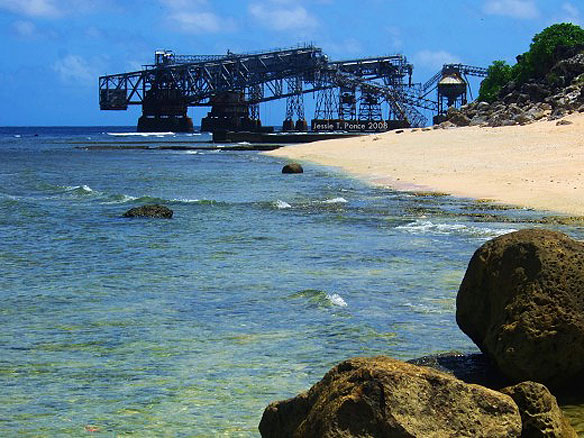COMMENT: I am a Nauruan
Luxury and avarice — those pests which have been the ruin of every state.–Cato the Elder
[I wrote this essay for the By The People program of Nelson’s Community Radio on October 6. 2006. There is a renewed concern about the resource industry – oil, gas, forestry, coal – in Northern British Columbia. Sue, who grew up in Northern B.C., thought it was time to republish this essay. I totally agree.]
“Ich bin ein Berliner!” With these words President Kennedy declared solidarity with the people of West Berlin during the height of the Cold War. I am declaring solidarity with the people of Nauru.
Nauru, the world’s smallest independent republic, is an island in the Micronesian South Pacific. It has a population of 13,000 and covers 21 square kilometres. According to archeologists the island was first populated by Micronesians and Polynesians 3,000 years ago. It was discovered by Europeans in 1798 and was attached to the German Marshall Islands protectorate in 1888. After being ruled by a succession of foreign powers, Nauru gained independence in 1968.
For nearly 3,000 years the island and surrounding ocean provided the Nauruans with all the material goods they needed. The people knew the flora and fauna of their island, and they knew the fish in their ocean. But until the Europeans arrived, they did not know that their island was a phosphate rock.
Phosphate mining began on Nauru in 1907. For two decades after independence Nauruans enjoyed one of the highest standards of living in the Pacific. But the island’s phosphate reserves are now depleted. Strip mining has severely degraded the island’s environment, and the land is no longer suitable for agriculture. The coral reefs are destroyed, poisoned by phosphate dust. In the 19th century Nauruans supplied foodstuff to whaling ships and traders plying the South Pacific. Today, everything needed for human habitation on the island, food, clothing, and building materials, must be brought in from Australia. Nauru earns a pittance from rental revenue for a detention centre in which Australia keeps its unwanted asylum seekers. Diabetes is rampant among the indigenous people and the average life expectancy is declining. A lone, rusty dragline scraping together the remnants of the island’s phosphate deposits is all that remains of the once flourishing mining economy. To provide a marginal income for a few islanders, Nauruans continue to assault their impoverished environment.
Nauruans could see that their island’s phosphate reserves would eventually be exhausted, but they continued to invest in technology to pick up the pace of exploitation, as if digging faster would secure their lifestyle for the long-term. The macro-economic strategy followed by Nauruans resembles our own strategy for the exploitation of resources. We invest heavily in technology designed to maximize efficient extraction of every resource from every continent and from every ocean.
Oil is an example. Some say that proven oil reserves will start to decline in fifty years, give or take a decade. Fifty years seems like a long time in a world that marks time in quarterly reports, and it certainly is beyond my lifetime. We fail to appreciate that the depletion of a non-renewable resource does not begin when the end is in sight; it begins with the first extraction.
Modern oil extraction and refining began in the 1850s. At that time the world’s population was 1.2 billion. Global daily oil production now exceeds 81 billion barrels. Global population today exceeds 6 billion, and the demand for oil keeps growing. Encouraged by the governments we elect, corporations respond to that demand by investing in technology to extract the remaining oil more efficiently for greater profits. Oil extraction is not unique. Oil only showcases the voracious rate at which we consume and waste the world’s resources. From fish to forests, the accelerated rate at which we devour the world’s resources exceeds the rate of growth of the world’s population.
Nauru is a long way from Canada, but it is an example of the consequences of environmental stewardship devoid of ethics. Nauruans regret that earlier generations did not take better care of the island’s environment. The utter devastation of Nauru’s environment was not an accident of history; it was perpetrated by 20th century generations, and we continue the same devastating practices in the face of overwhelming evidence of destruction.
While governments agonize about implementing the Kyoto Protocol, corporate interests have their eyes on the Northwest Passage. Once global warming has cleared the ice, it will be the shortest and most profitable trade route linking Europe and Asia. Local recycling programs are not enough to counteract the attitude of a corporate culture that sees business opportunities in global warming.
We can learn two lessons from Nauru: the common people, not corporations are left to cope with the consequences of environmental rape, and a devastated environment threatens continued life, including human life, in that environment.
Single-minded exploitation is a learned human behaviour. We not only can, but must change that behaviour. Corporations are artificial entities we created. To dissuade them from their behaviour we must change their overriding belief that money is the only value, and that everything can be converted into money.
The need to act is urgent; procrastination only serves to continue the waste of precious resources. It came for Nauruans, and for us too the day will come when our resource extraction economy is reduced to a rusty dragline scraping together the remnants of our glory days.
The question is not whether Nauru is an exception. The question is which island will be next? When will our turn come? When I reach old age, my grandson will be in his early twenties. My question has to be: Is recycling milk jugs all I need to do so that he too may reach old age?


























